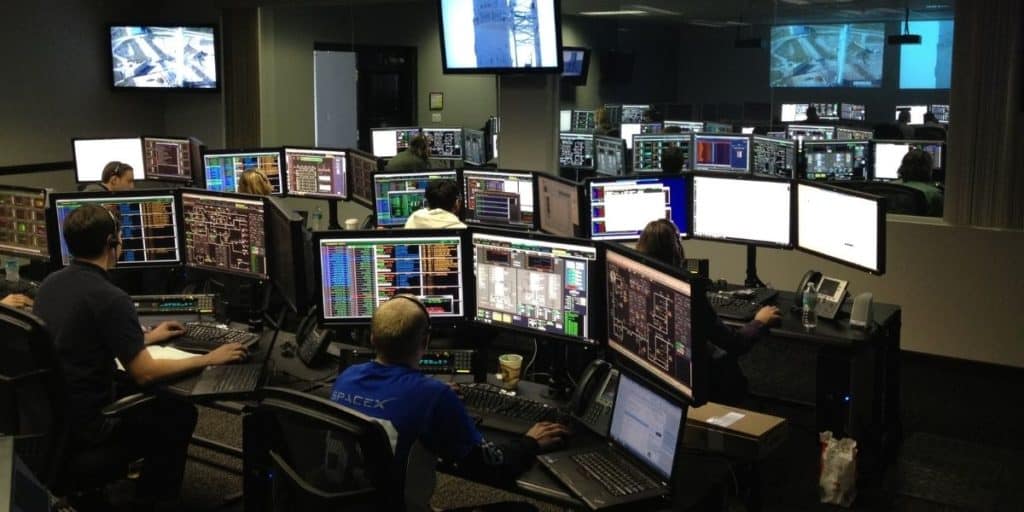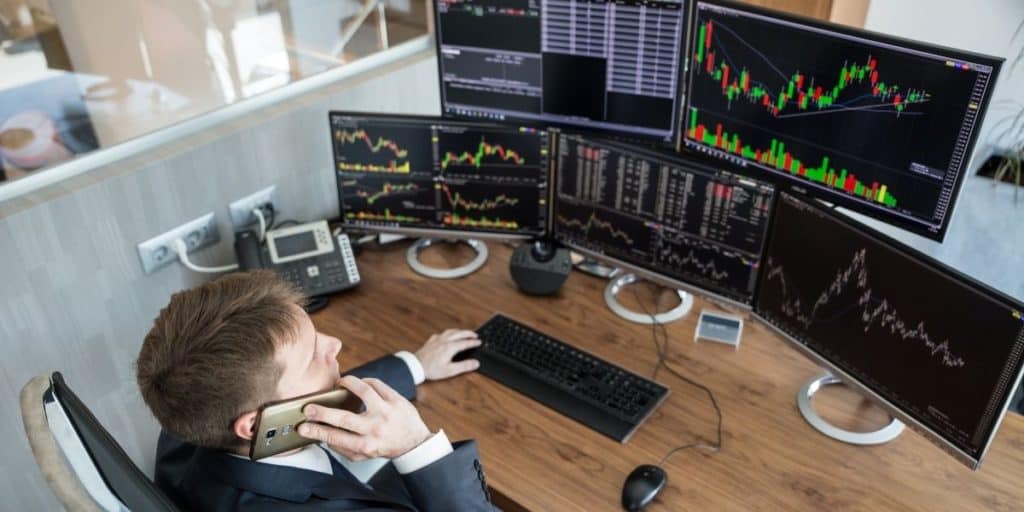In the last few decades, laptops have replaced desktops in many aspects of our lives, and understandably so: they’re fast, portable and powerful for everyday use. But when it comes to trading, it’s not always clear whether laptops can do as well as (or even better than) desktops because a trader’s needs are different from those of the average PC user.
Desktops are better than laptops for trading because they meet traders’ needs more effectively. While laptops are more portable, desktops provide more built-in processing power and customization options. Additionally, it’s easier to set up multiple screens with a desktop than a laptop.
Read on to learn more about how desktops stack up against laptops when it comes to meeting a trader’s computing needs.
IMPORTANT SIDENOTE: I surveyed 1500+ traders to understand how social trading impacted their trading outcomes. The results shocked my belief system! Read my latest article: ‘Exploring Social Trading: Community, Profit, and Collaboration’ for my in-depth findings through the data collected from this survey!
Table of Contents
Laptops vs. Desktops for Trading
To make it easier to choose between a laptop and a desktop, let’s compare these two types of computers based on the most critical requirements for a trading machine. The requirements are as follows:
- Portability
- Multi-screen capabilities
- Built-in processing power
- Customization options
Let’s tackle each item separately.

Portability
The importance of portability in a trading computer varies with individual traders. Most commonly, it comes down to whether you travel a lot or trade from a fixed workstation.
Laptops are superior when it comes to portability. It can be cumbersome to haul a desktop around, not to mention the weird looks you might attract if you do that.
Multi-Screen Capabilities
What comes to your mind when you imagine a professional trader at work? For most people, it’s an image of a person sitting in front of several screens with various graph charts, indicators, and tickers magnificently displayed on them.
And while that might seem like a cliche or an attempt to look impressive, most high-octane traders need multiple screens. Having multiple monitors makes it easier for traders to track things like order flows, technical charts of various markets, sentiment indexes, trading time frames, and more.
Generally speaking, whether you need multiple screens comes down to your trading experience and style.
Newer traders tend to keep things simple when it comes to analytics and trading styles, so they might not need several monitors because they don’t have too much data to track. But as they learn the intricacies of trading and adopt more advanced strategies, the need for several screens may arise.
For experienced traders, the need for several screens depends on the trading style. For instance, position or swing traders may do just fine with one or two monitors because such trades take days (and sometimes months) to execute, allowing ample time for analysis.
On the other hand, traders using fast-paced strategies such as day trading and scalping typically don’t have much time for analysis. They need quick access to multiple data feeds simultaneously, hence the need for multiple monitors. The same goes for algorithmic traders, who need to run multiple programs when performing advanced backtests.
So, how do laptops stack up against desktops in terms of multi-screen capabilities?
Desktops take the day, hands down. That’s because they come with more options for multi-monitor setups than laptops. While most laptops support dual monitors, you’ll likely need to do some customization to achieve more than that.
That’s not to mention that desktop graphics cards tend to be better than those of similarly-priced laptops. As an FYI, your graphics card is one of the most critical determinants of the number of screens your computer can support.
Desktops are also a better option for split-screen capabilities (when you need to divide your screen into two or more segments to facilitate simultaneous presentation of multiple files or charts). That’s because laptops usually come with smaller screens, whereas desktops allow you to connect virtually any monitor size.
Built-In Processing Power
When choosing a trading PC, processing speed is crucial, more so if you use fast-paced trading styles like day trading.
You need your computer to pack enough processing power to run your trading software without lags, track market data in real-time, and make the necessary calculations instantly. Few things can be as frustrating as missing a lucrative trade because your PC took too long to calculate your criteria.
A CPU’s processing speed is a function of its cores and clock speed. These two elements combine to determine whether your computer executes commands instantly or painfully slowly. They also determine how much information your PC can handle at a time and how quickly that data is processed.
So yeah, processing speed is a big deal for a trader.
According to HP, desktops typically pack more processing speed than laptops. The rationale is that the extra space in a desktop’s chassis allows for more robust hardware, resulting in better performance. Also, desktops typically have better cooling systems than laptops, which allows the processor to sustain high performance for extended periods without overheating.
Wondering how better cooling systems translate to more processing speed? Let me explain.
You see, extreme overheating can damage your PC’s internal components and cause permanent data loss. Best case scenario, it shortens the life of your PC’s components.
To prevent this kind of damage, modern PC manufacturers design graphics chips and PC processors to automatically adjust themselves to run at lower levels to reduce the amount of heat they generate. This capability is known as Dynamic frequency scaling or CPU throttling, and one of its impacts on PC performance is slowing down your processor.
So when a PC has a great cooling system, CPU throttling is less likely to happen, and its processor will keep operating at an optimum level for extended periods. This is one of the main reasons a desktop may have better processing power than a laptop with similar specs.
Customization Options
You might not need too much RAM and processing power when you’re just getting started as a trader because your analysis and trading style aren’t too complicated. But as your trading skills and methods evolve, you might need to upgrade the elements to boost your computer’s performance.
You also want to upgrade your PC’s graphics card because it’s one of the most crucial determinants of whether your computer supports multiple monitors.
When you need upgrades, you’ll want your PC to give you customization options. Unfortunately, laptops don’t provide as much room for customization as desktops. And when they do, the upgrades are usually more expensive than desktops.
Why? Three reasons:
- It’s easier to remove a desktop CPU for upgrades. Laptop CPUs are usually soldered into the motherboard. So if you need to upgrade things like the processor, you’ll likely need to pay a technician to do it for you. And sometimes an upgrade isn’t possible at all due to limitations set by the manufacturer.
- A desktop’s RAM is more expandable. Most mid-range desktops come with four memory slots. Rarely will all these slots be occupied in a new computer; manufacturers typically leave two slots empty to allow users to install more RAM if necessary. On the other hand, laptops have two or three memory slots. So although the RAM is expandable, you don’t quite have the same margin as a desktop.
- A desktop has more space for components than a laptop. The limited space in laptops means their parts will cost more than desktop parts with similar specifications. Miniaturizing computer parts makes them more expensive to manufacture, which increases their cost. That’s one of the main reasons laptops cost more than desktops, even when both machines have identical specs.
Author’s Recommendations: Top Trading and Investment Resources To Consider
Before concluding this article, I wanted to share few trading and investment resources that I have vetted, with the help of 50+ consistently profitable traders, for you. I am confident that you will greatly benefit in your trading journey by considering one or more of these resources.
- Roadmap to Becoming a Consistently Profitable Trader: I surveyed 5000+ traders (and interviewed 50+ profitable traders) to create the best possible step by step trading guide for you. Read my article: ‘7 Proven Steps To Profitable Trading’ to learn about my findings from surveying 5000+ traders, and to learn how these learnings can be leveraged to your advantage.
- Best Broker For Trading Success: I reviewed 15+ brokers and discussed my findings with 50+ consistently profitable traders. Post all that assessment, the best all round broker that our collective minds picked was M1 Finance. If you are looking to open a brokerage account, choose M1 Finance. You just cannot go wrong with it! Click Here To Sign Up for M1 Finance Today!
- Best Trading Courses You Can Take For Free (or at extremely low cost): I reviewed 30+ trading courses to recommend you the best resource, and found Trading Strategies in Emerging Markets Specialization on Coursera to beat every other course on the market. Plus, if you complete this course within 7 days, it will cost you nothing and will be absolutely free! Click Here To Sign Up Today! (If you don’t find this course valuable, you can cancel anytime within the 7 days trial period and pay nothing.)
- Best Passive Investment Platform For Exponential (Potentially) Returns: By enabling passive investments into a Bitcoin ETF, Acorns gives you the best opportunity to make exponential returns on your passive investments. Plus, Acorns is currently offering a $15 bonus for simply singing up to their platform – so that is one opportunity you don’t want to miss! (assuming you are interested in this platform). Click Here To Get $15 Bonus By Signing Up For Acorns Today! (It will take you less than 5 mins to sign up, and it is totally worth it.)

Conclusion: Desktops vs. Laptops for Trading
Overall, desktops are better suited to trading than laptops. While laptops are more portable, desktops outperform three critical requirements for a trading PC: built-in processing speed, customization options, and multi-screen capabilities. Add to that the fact that desktops are typically cheaper than similarly spec’d laptops, and it becomes clear that the former is a better choice for a trader.
BEFORE YOU GO: Don’t forget to check out my latest article – ‘Exploring Social Trading: Community, Profit, and Collaboration’. I surveyed 1500+ traders to identify the impact social trading can have on your trading performance, and shared all my findings in this article. No matter where you are in your trading journey today, I am confident that you will find this article helpful!
Affiliate Disclosure: We participate in several affiliate programs and may be compensated if you make a purchase using our referral link, at no additional cost to you. You can, however, trust the integrity of our recommendation. Affiliate programs exist even for products that we are not recommending. We only choose to recommend you the products that we actually believe in.
Recent Posts
Exploring Social Trading: Community, Profit, and Collaboration
Have you ever wondered about the potential of social trading? Well, that curiosity led me on a fascinating journey of surveying over 1500 traders. The aim? To understand if being part of a trading...
Ah, wine investment! A tantalizing topic that piques the curiosity of many. A complex, yet alluring world where passions and profits intertwine. But, is it a good idea? In this article, we'll uncork...
